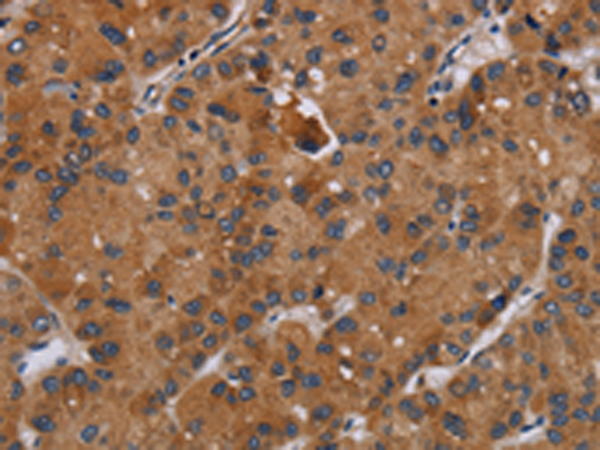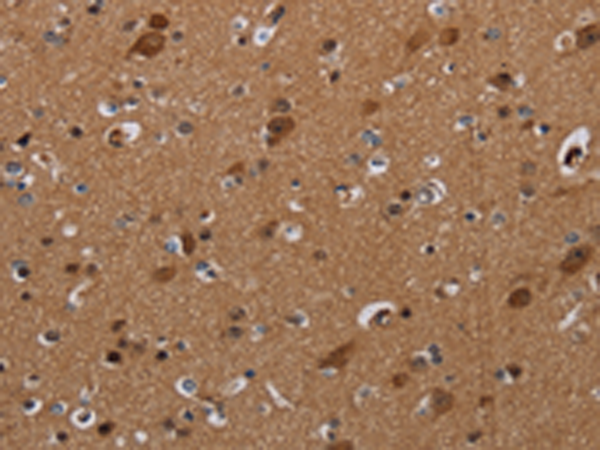

| WB | 咨询技术 | Human,Mouse,Rat |
| IF | 咨询技术 | Human,Mouse,Rat |
| IHC | 1/25-1/100 | Human,Mouse,Rat |
| ICC | 技术咨询 | Human,Mouse,Rat |
| FCM | 咨询技术 | Human,Mouse,Rat |
| Elisa | 1/1000-1/2000 | Human,Mouse,Rat |
| Aliases | SCZD9; C1orf136 |
| Host/Isotype | Rabbit IgG |
| Antibody Type | Primary antibody |
| Storage | Store at 4°C short term. Aliquot and store at -20°C long term. Avoid freeze/thaw cycles. |
| Species Reactivity | Human |
| Immunogen | Synthetic peptide of human DISC1 |
| Formulation | Purified antibody in PBS with 0.05% sodium azide and 50% glycerol. |
+ +
以下是3篇关于DISC1抗体的参考文献摘要信息:
---
1. **"Characterization of a novel antibody directed against the disrupted-in-schizophrenia 1 (DISC1) protein"**
- **作者**: Sawamura N, et al.
- **摘要**: 该研究开发并验证了一种针对DISC1蛋白C末端的新型单克隆抗体,通过Western blot和免疫组化证实其特异性,并用于分析DISC1在大脑组织中的分布及与神经发育相关蛋白的相互作用。
2. **"DISC1 regulates synaptic vesicle transport via a novel interaction with the kinesin-1 motor protein KIF5A"**
- **作者**: Tsuboi D, et al.
- **摘要**: 利用特异性DISC1抗体,研究发现DISC1通过与驱动蛋白KIF5A的相互作用调控突触小泡运输,抗体在共免疫沉淀和免疫荧光实验中证实了DISC1-KIF5A复合物的存在及其功能关联。
3. **"DISC1 variants and protein expression in postmortem brain tissue: implications for psychiatric disorders"**
- **作者**: Leliveld SR, et al.
- **摘要**: 通过多种DISC1抗体对精神疾病患者尸检脑组织进行分析,揭示了DISC1蛋白表达水平与基因变异的相关性,并探讨了不同抗体在检测DISC1亚型时的特异性差异。
---
如需获取完整文献,建议通过PubMed或期刊数据库搜索标题与作者。
The DISC1 (Disrupted in Schizophrenia 1) antibody is a key tool for studying the DISC1 protein, initially identified through genetic linkage studies in a Scottish family with a high prevalence of schizophrenia and mood disorders. Discovered in 2000. DISC1 gained attention due to a chromosomal translocation (1q42.1; 11q14.3) disrupting the gene, correlating with psychiatric phenotypes. The DISC1 protein plays critical roles in neurodevelopment, including neuronal migration, synaptic plasticity, and signaling pathways. It interacts with diverse molecular partners (e.g., NDEL1. PDE4B) to regulate processes like cAMP signaling and cytoskeletal dynamics.
DISC1 antibodies are widely used in research to detect protein expression, localization, and interactions in brain tissues or cell models. However, inconsistencies in antibody specificity (due to epitope variability, isoform diversity, or cross-reactivity) have led to challenges in replicating findings across studies. This has prompted calls for standardized validation protocols. Despite these issues, DISC1 remains a focal point in psychiatric and neurodevelopmental research, with antibodies aiding investigations into its role in mental illness pathophysiology. Recent efforts also explore its relevance in neurogenesis, mitochondrial function, and as a potential biomarker. Ongoing work aims to clarify DISC1's molecular mechanisms and therapeutic potential, emphasizing the need for high-quality, well-characterized antibodies to advance this field.
×